
SFlux
Related Docs:
object SFlux
| package publisher







Alias for SFlux.concatWith
Alias for SFlux.concatWith


Emit a single boolean true if all values of this sequence match the given predicate.
Emit a single boolean true if all values of this sequence match the given predicate.
The implementation uses short-circuit logic and completes with false if the predicate doesn't match a value.

the predicate to match all emitted items
a SMono of all evaluations

Emit a single boolean true if any of the values of this SFlux sequence match the predicate.
Emit a single boolean true if any of the values of this SFlux sequence match the predicate.
The implementation uses short-circuit logic and completes with true if the predicate matches a value.
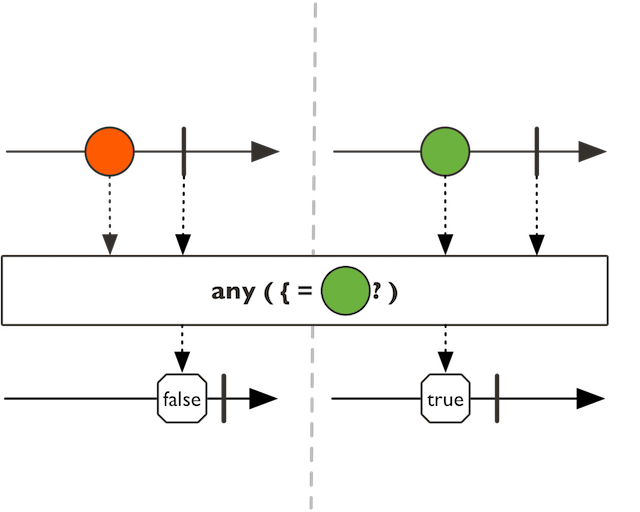
predicate tested upon values
a new SFlux with true if any value satisfies a predicate and false
otherwise

Immediately apply the given transformation to this SFlux in order to generate a target type.
Immediately apply the given transformation to this SFlux in order to generate a target type.
flux.as(Mono::from).subscribe()
the returned type
the Function1 to immediately map this SFlux into a target type instance.
a an instance of P
SFlux.compose for a bounded conversion to Publisher



Blocks until the upstream signals its first value or completes.
Blocks until the upstream signals its first value or completes.
the Some value or None

Blocks until the upstream completes and return the last emitted value.
Blocks until the upstream completes and return the last emitted value.
max duration timeout to wait for.
the last value or None

Collect incoming values into multiple Seq that will be pushed into the returned SFlux when the given max size is reached or onComplete is received.
Collect incoming values into multiple Seq that will be pushed into the returned SFlux when the given max size is reached or onComplete is received. A new container Seq will be created every given skip count.
When Skip > Max Size : dropping buffers
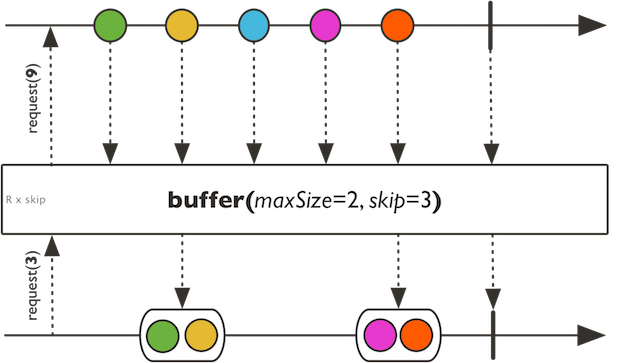
When Skip < Max Size : overlapping buffers
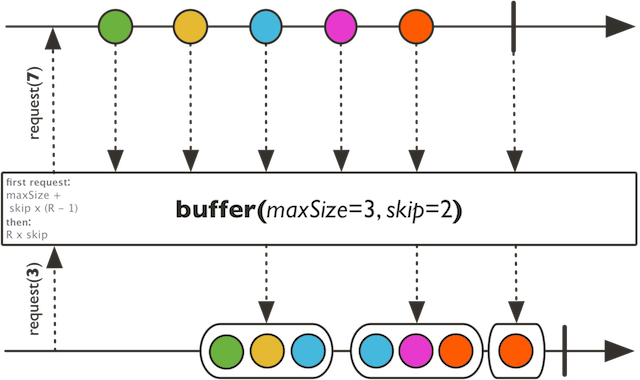
When Skip == Max Size : exact buffers
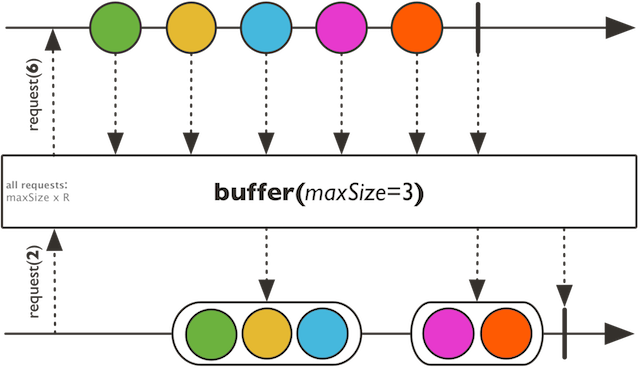
the supplied Seq type
the max collected size
the collection to use for each data segment
the number of items to skip before creating a new bucket
a microbatched SFlux of possibly overlapped or gapped Seq

Collect incoming values into multiple Seq delimited by the given Publisher signals.
Collect incoming values into multiple Seq delimited by the given Publisher signals.
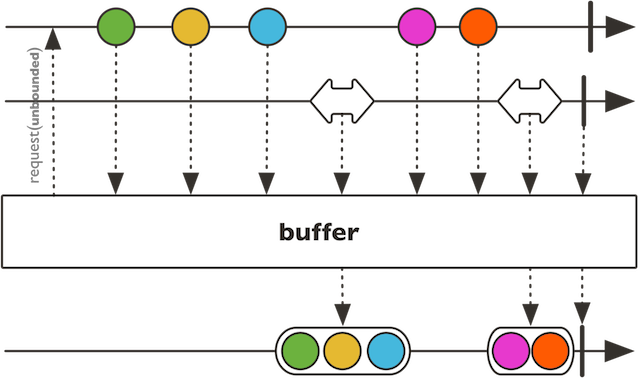
the supplied Seq type
the other Publisher to subscribe to for emitting and recycling receiving bucket
the collection to use for each data segment
a microbatched SFlux of Seq delimited by a Publisher


Collect incoming values into a Seq that will be pushed into the returned SFlux every timespan OR maxSize items.
Collect incoming values into a Seq that will be pushed into the returned SFlux every timespan OR maxSize items.
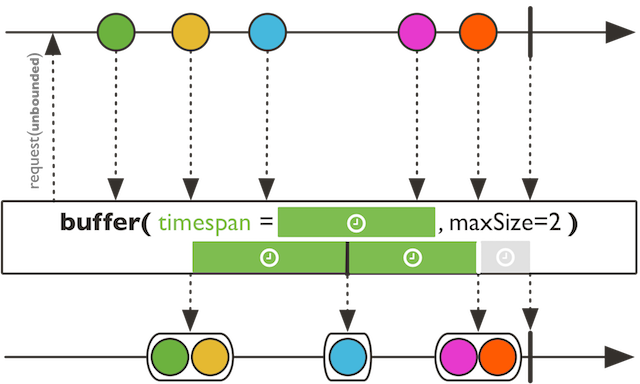
the supplied Seq type
the max collected size
the timeout to use to release a buffered list
the collection to use for each data segment
a microbatched SFlux of Seq delimited by given size or a given period timeout

Collect incoming values into multiple Seq that will be pushed into the returned SFlux each time the given predicate returns true.
Collect incoming values into multiple Seq that will be pushed into
the returned SFlux each time the given predicate returns true. Note that
the buffer into which the element that triggers the predicate to return true
(and thus closes a buffer) is included depends on the cutBefore parameter:
set it to true to include the boundary element in the newly opened buffer, false to
include it in the closed buffer (as in SFlux.bufferUntil).

On completion, if the latest buffer is non-empty and has not been closed it is emitted. However, such a "partial" buffer isn't emitted in case of onError termination.
a predicate that triggers the next buffer when it becomes true.
set to true to include the triggering element in the new buffer rather than the old.
a microbatched SFlux of Seq

Collect incoming values into multiple Seq delimited by the given Publisher signals.
Collect incoming values into multiple Seq delimited by the given Publisher signals. Each Seq bucket will last until the mapped Publisher receiving the boundary signal emits, thus releasing the bucket to the returned SFlux.
When Open signal is strictly not overlapping Close signal : dropping buffers
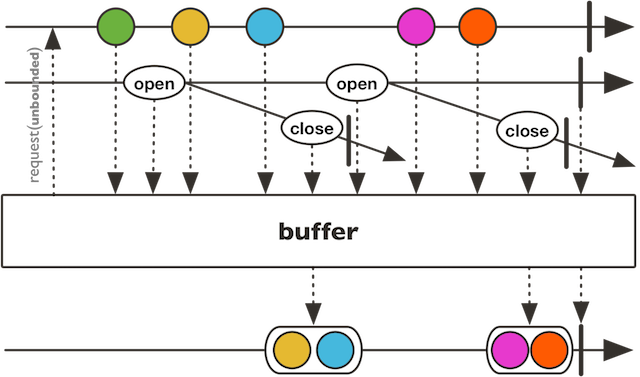
When Open signal is strictly more frequent than Close signal : overlapping buffers
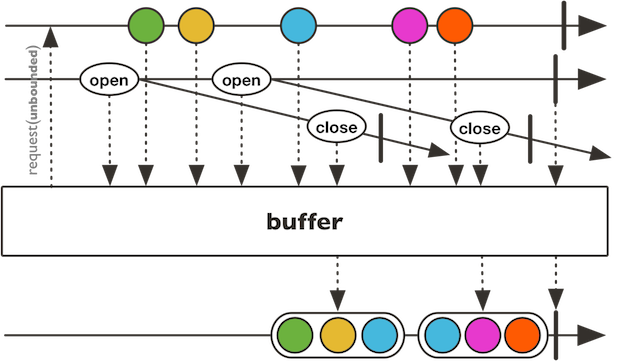
When Open signal is exactly coordinated with Close signal : exact buffers

the element type of the bucket-opening sequence
the element type of the bucket-closing sequence
the supplied Seq type
a Publisher to subscribe to for creating new receiving bucket signals.
a Publisher factory provided the opening signal and returning a Publisher to subscribe to for emitting relative bucket.
the collection to use for each data segment
a microbatched SFlux of Seq delimited by an opening Publisher and a relative closing Publisher

Collect incoming values into multiple Seq that will be pushed into the returned SFlux.
Collect incoming values into multiple Seq that will be pushed into the returned SFlux. Each buffer continues aggregating values while the given predicate returns true, and a new buffer is created as soon as the predicate returns false... Note that the element that triggers the predicate to return false (and thus closes a buffer) is NOT included in any emitted buffer.

On completion, if the latest buffer is non-empty and has not been closed it is emitted. However, such a "partial" buffer isn't emitted in case of onError termination.
a predicate that triggers the next buffer when it becomes false.
a microbatched SFlux of Seq

Turn this SFlux into a hot source and cache last emitted signals for further Subscriber.

Prepare this SFlux so that subscribers will cancel from it on a specified Scheduler.

Cast the current SFlux produced type into a target produced type.

Activate assembly tracing or the lighter assembly marking depending on the
forceStackTrace option.
Activate assembly tracing or the lighter assembly marking depending on the
forceStackTrace option.
By setting the forceStackTrace parameter to true, activate assembly
tracing for this particular SFlux and give it a description that
will be reflected in the assembly traceback in case of an error upstream of the
checkpoint. Note that unlike SFlux.checkpoint(Option[String]), this will incur
the cost of an exception stack trace creation. The description could for
example be a meaningful name for the assembled flux or a wider correlation ID,
since the stack trace will always provide enough information to locate where this
Flux was assembled.
By setting forceStackTrace to false, behaves like
SFlux.checkpoint(Option[String]) and is subject to the same caveat in choosing the
description.
It should be placed towards the end of the reactive chain, as errors triggered downstream of it cannot be observed and augmented with assembly marker.
a description (must be unique enough if forceStackTrace is set to false).
false to make a light checkpoint without a stacktrace, true to use a stack trace.
the assembly marked SFlux.












Concatenate emissions of this SFlux with the provided Publisher (no interleave).


Provide a default unique value if this sequence is completed without any data
Provide a default unique value if this sequence is completed without any data

the alternate value if this sequence is empty
a new SFlux

Delay each of this SFlux elements Subscriber#onNext signals)
by a given duration.
Delay each of this SFlux elements Subscriber#onNext signals)
by a given duration. Signals are delayed and continue on an user-specified
Scheduler, but empty sequences or immediate error signals are not delayed.
period to delay each Subscriber#onNext signal
a time-capable Scheduler instance to delay each signal on
a delayed SFlux





































Divide this sequence into dynamically created SFlux (or groups) for each unique key, as produced by the provided keyMapper.
Divide this sequence into dynamically created SFlux (or groups) for each unique key, as produced by the provided keyMapper. Source elements are also mapped to a different value using the valueMapper. Note that groupBy works best with a low cardinality of groups, so chose your keyMapper function accordingly.
The groups need to be drained and consumed downstream for groupBy to work correctly.
Notably when the criteria produces a large amount of groups, it can lead to hanging
if the groups are not suitably consumed downstream (eg. due to a flatMap
with a maxConcurrency parameter that is set too low).
the key type extracted from each value of this sequence
the value type extracted from each value of this sequence
the key mapping function that evaluates an incoming data and returns a key.
the value mapping function that evaluates which data to extract for re-routing.
the number of values to prefetch from the source
a SFlux of SGroupedFlux grouped sequences


Handle the items emitted by this SFlux by calling a biconsumer with the output sink for each onNext.
Handle the items emitted by this SFlux by calling a biconsumer with the output sink for each onNext. At most one SynchronousSink.next(Anyref) call must be performed and/or 0 or 1 SynchronousSink.error(Throwable) or SynchronousSink.complete().
the transformed type
the handling Function2
a transformed SFlux










Observe all Reactive Streams signals and use Logger support to handle trace implementation.
Observe all Reactive Streams signals and use Logger support to handle trace implementation. Default will use Level.INFO and java.util.logging. If SLF4J is available, it will be used instead.

The default log category will be "reactor.*", a generated operator suffix will complete, e.g. "reactor.Flux.Map".
a new unaltered SFlux

Transform the items emitted by this SFlux by applying a synchronous function to each item.
Transform the items emitted by this SFlux by applying a synchronous function to each item.
the transformed type
the synchronous transforming Function1
a transformed { @link Flux}




Activate metrics for this sequence, provided there is an instrumentation facade on the classpath (otherwise this method is a pure no-op).
























Prepare to consume this SFlux on number of 'rails' matching number of CPU in round-robin fashion.
Prepare to consume this SFlux on number of 'rails' matching number of CPU in round-robin fashion.

the number of parallel rails
the number of values to prefetch from the source
a new SParallelFlux instance

Multiple all element within this SFlux given the type element is Numeric

Prepare a ConnectableSFlux which shares this SFlux sequence and dispatches values to subscribers in a backpressure-aware manner.
Prepare a ConnectableSFlux which shares this SFlux sequence and dispatches values to subscribers in a backpressure-aware manner. This will effectively turn any type of sequence into a hot sequence.
Backpressure will be coordinated on org.reactivestreams.Subscription.request and if any Subscriber is missing demand (requested = 0), multicast will pause pushing/pulling.
bounded requested demand
a new ConnectableSFlux

Prepare a SMono which shares this SFlux sequence and dispatches the first observed item to subscribers in a backpressure-aware manner.





Retries this SFlux in response to signals emitted by a companion Publisher.
Retries this SFlux in response to signals emitted by a companion Publisher.
The companion is generated by the provided Retry instance, see Retry#max(long), Retry#maxInARow(long)
and Duration) for readily available strategy builders.
The operator generates a base for the companion, a SFlux of reactor.util.retry.Retry.RetrySignal which each give metadata about each retryable failure whenever this SFlux signals an error. The final companion should be derived from that base companion and emit data in response to incoming onNext (although it can emit less elements, or delay the emissions).
Terminal signals in the companion terminate the sequence with the same signal, so emitting an Subscriber#onError(Throwable)
will fail the resulting SFlux with that same error.
Note that the Retry.RetrySignal state can be transient and change between each source
onError or
onNext. If processed with a delay,
this could lead to the represented state being out of sync with the state at which the retry
was evaluated. Map it to Retry.RetrySignal#copy() right away to mediate this.
Note that if the companion Publisher created by the whenFactory
emits reactor.util.context.Context as trigger objects, these reactor.util.context.Context will be merged with
the previous Context:
Retry customStrategy = Retry.fromFunction(companion -> companion.handle((retrySignal, sink) -> { Context ctx = sink.currentContext(); int rl = ctx.getOrDefault("retriesLeft", 0); if (rl > 0) { sink.next(Context.of( "retriesLeft", rl - 1, "lastError", retrySignal.failure() ));else { sink.error(Exceptions.retryExhausted("retries exhausted", retrySignal.failure())); } })); Fluxretried = originalFlux.retryWhen(customStrategy); }
a { @link Flux} that retries on onError when a companion { @link Publisher} produces an onNext signal
Retry.backoff(long, Duration)
Retry.maxInARow(long)
Retry.max(long)

Sample this SFlux by periodically emitting an item corresponding to that SFlux latest emitted value within the periodical time window.
Sample this SFlux by periodically emitting an item corresponding to that SFlux latest emitted value within the periodical time window. Note that if some elements are emitted quicker than the timespan just before source completion, the last of these elements will be emitted along with the onComplete signal.
the duration of the window after which to emit the latest observed item
a SFlux sampled to the last item seen over each periodic window

Repeatedly take a value from this SFlux then skip the values that follow within a given duration.

Reduce this SFlux values with an accumulator Function2 and also emit the intermediate results of this function.
Reduce this SFlux values with an accumulator Function2 and also emit the intermediate results of this function.
The accumulation works as follows:
result[0] = initialValue;
result[1] = accumulator(result[0], source[0])
result[2] = accumulator(result[1], source[1])
result[3] = accumulator(result[2], source[2])
...
the accumulated type
the initial value
an accumulating SFlux starting with initial state

Reduce this SFlux values with an accumulator Function2 and also emit the intermediate results of this function.
Reduce this SFlux values with an accumulator Function2 and also emit the intermediate results of this function.
Unlike Function2), this operator doesn't take an initial value
but treats the first SFlux value as initial value.
The accumulation works as follows:
result[0] = source[0]
result[1] = accumulator(result[0], source[1])
result[2] = accumulator(result[1], source[2])
result[3] = accumulator(result[2], source[3])
...
the accumulating Function2
an accumulating SFlux

Reduce this SFlux values with an accumulator Function2 and also emit the intermediate results of this function.
Reduce this SFlux values with an accumulator Function2 and also emit the intermediate results of this function.
The accumulation works as follows:
result[0] = initialValue;
result[1] = accumulator(result[0], source[0])
result[2] = accumulator(result[1], source[1])
result[3] = accumulator(result[2], source[2])
...
the accumulated type
the initial value computation
the accumulating Function2
an accumulating SFlux starting with initial state










Prepend the given Publisher sequence to this SFlux sequence.



Subscribe to this SFlux and request unbounded demand.
Subscribe to this SFlux and request unbounded demand.
This version doesn't specify any consumption behavior for the events from the chain, especially no error handling, so other variants should usually be preferred.
a new Disposable that can be used to cancel the underlying org.reactivestreams.Subscription

Subscribe a consumer to this SFlux that will consume all the
sequence.
Subscribe a consumer to this SFlux that will consume all the
sequence. It will request an unbounded demand.
For a passive version that observe and forward incoming data see SFlux.doOnNext.
For a version that gives you more control over backpressure and the request, see SFlux.subscribe with a reactor.core.publisher.BaseSubscriber.

the consumer to invoke on each value
the consumer to invoke on error signal
the consumer to invoke on complete signal
a new Disposable to dispose the org.reactivestreams.Subscription



Provide an alternative if this sequence is completed without any data
Provide an alternative if this sequence is completed without any data
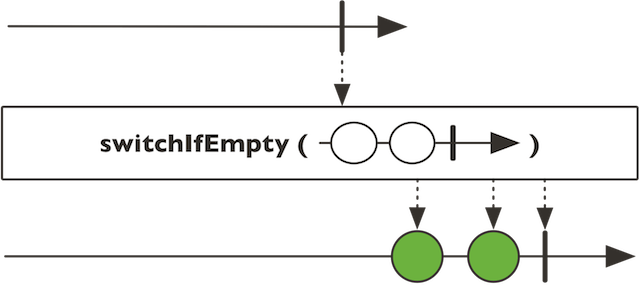
the alternate publisher if this sequence is empty
an alternating SFlux on source onComplete without elements




Alias for skip(1)




























(Since version reactor-scala-extensions 0.5.0) will be removed, use transformDeferred() instead

Use foldWith instead

Use retryWhen(Retry)